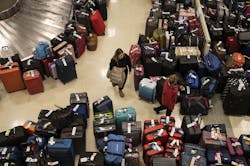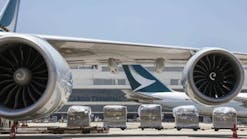DOT Investigating if ‘Unrealistic Scheduling’ at Southwest Airlines Led to Meltdown
U.S. Department of Transportation officials are investigating Dallas-based Southwest Airlines over whether the carrier’s holiday meltdown that stranded millions of travelers was caused by overscheduling flights.
The regulatory agency said Wednesday that it’s stepping up the investigation into Southwest’s potential shortcomings and pledged a “rigorous and comprehensive” examination of the holiday debacle.
“DOT is also probing whether Southwest executives engaged in unrealistic scheduling of flights which under federal law is considered an unfair and deceptive practice,” a Department of Transportation spokesperson said in a statement. “DOT will leverage the full extent of its investigative and enforcement power to ensure consumers are protected.”
Company spokesman Chris Mainz pushed back on the idea it deceived customers with a schedule it couldn’t meet.
“Our holiday flight schedule was thoughtfully designed and offered to our customers with the backing of a solid plan to operate it, and with ample staffing,” Mainz said in an emailed statement. “Our systems and processes became stressed while working to recover from multiple days of flight cancellations across 50 airports in the wake of an unprecedented storm. We’re acutely focused on learning from this event, mitigating the risk of a repeat occurrence, and delivering the hospitality and outstanding service our customers expect from us.”
Transportation Secretary Pete Buttigieg had already taken aim at Southwest over the 16,700 cancellations in late December that left travelers without flights during the busy holiday stretch. The agency has pushed Southwest to provide timely refunds and reimbursements to disrupted passengers and has even threatened increased regulation if the travel industry can’t provide more reliability to customers.
Southwest has said the cold weather system hit key airports in Chicago and Denver, congealing fuel lines and plunging temperatures too low for ground crews to service planes. As delays piled up, the carrier’s software systems were unable to keep up with hundreds and eventually thousands of requests to reschedule pilots and flight attendants.
GE Digital, which created the crew scheduling software, has defended its systems.
“The GE Digital tool that is integrated into Southwest’s systems performed as designed throughout the event, and we are working with them to define new functionality as they improve their crew rescheduling capability,” a GE spokesperson said.
Analysts and union leaders have blamed the company’s underinvestments in key technologies. Southwest CEO Bob Jordan said the carrier spends about $1 billion a year on technology and plans additional improvements.
The company’s point-to-point flight network has also come under scrutiny because the crew problems spread across the entire country until Southwest was forced to cancel two-thirds of its flight schedule from Dec. 26 to 29 as it tried to “reset” its operations.
“There will be areas that we need to invest in even more, there will be things that we need to accelerate,” Jordan said in an interview with The Dallas Morning News earlier this month. “I guarantee there’ll be changes to our plan to put even more focus on operations because, and I can’t say it enough, this just can’t happen again.”
It has hired consulting firm Oliver Wyman to study what went wrong and its board of directors is conducting its own review. Southwest’s pilots’ union last week called for a strike authorization vote in May, describing it as a “historic action” that followed the epic meltdown and an “utter lack of meaningful progress on a contract negotiation, with scheduling work rules and information technology asks in particular, that has been ongoing for more than three years.”
Southwest estimates the meltdown will cost the company $725 million to $825 million in refunds, reimbursements, lost revenue and payments to passengers and employees who endured the worst operational calamity in the airline’s 51-year history. That includes flight credits worth about $300 to passengers who had flights canceled and delayed along with bonus pay and company store credits for workers.
©2023 The Dallas Morning News. Distributed by Tribune Content Agency, LLC.


